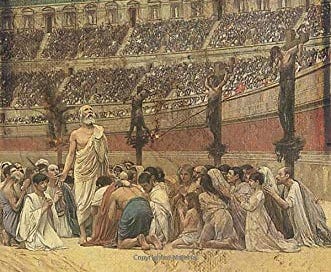If you are looking for the beginning of the study for Eusebius’ Church History then you can go HERE for a brief introduction. At the bottom of the introduction you will find the links to each section of the study guide as it becomes available. If you would like to see the growing list of book studies available for free on this site you can go HERE. Enjoy!
Virtues/Vices/Great Ideas: (Find them in the Text)
Indulgence, Justice
Grammar Questions: (The Information of the Text)
Who was Emperor of Rome when Jesus was born and how long had he been reigning?
Who is called “the most famous of the Hebrew historians”?
What was the name of the man who started a rebellion because of the census of Quirinius and what claim did he make?
Who was the first foreigner to become ruler of the Jewish nation?
According to Eusebius, what were the three phases of Jewish governance “following Moses and his successor Joshua”?
What happened “when the line of Jewish rulers ceased”?
In your own words, how did Eusebius reconcile the apparent disagreement between Jesus’ genealogies in Matthew and Luke?
Why, according to Eusebius (quoting Julius Africanus) did Herod burn “the genealogical records”?
According to the law of Moses, why couldn’t Jews marry outside of their own tribes?
What are three of the wicked deeds done by Herod (the Great)?
How did God bring justice upon Herod for his great evil?
Logic Questions: (Interpreting, Comparing/Contrasting, Reasoning)
Why are the records of the various rulers, their positions in government, and the length of their rules important and helpful to know?
Why would the Romans have placed a non-Jewish ruler over Judea?
What is meant by the statement that “the justice of God overtook [Herod] while he was still alive as a prelude to what awaited him in the next world”?
Rhetoric Questions: (The Analysis of Ideas in the Text)
Given that the practice of providing offspring for deceased relatives has biblical precedence, should Christians today still follow this practice? Why or why not?
What vices do you see present in the life of Herod the Great? In what manner do they manifest themselves?
Theological Analysis: (Sola Scriptura)
Read Acts 12:20-23. This story is about Herod Antipas, the son of Herod the Great and brother of Herod Archileus. What is similar about the fates suffered by Herod Anitpas and Herod the Great?
Read Deuteronomy 5:5-10. What additional details do we learn from this passage about the practice of providing offspring for a deceased brother? In particular, what is done to the man who will not do this for his brother?



